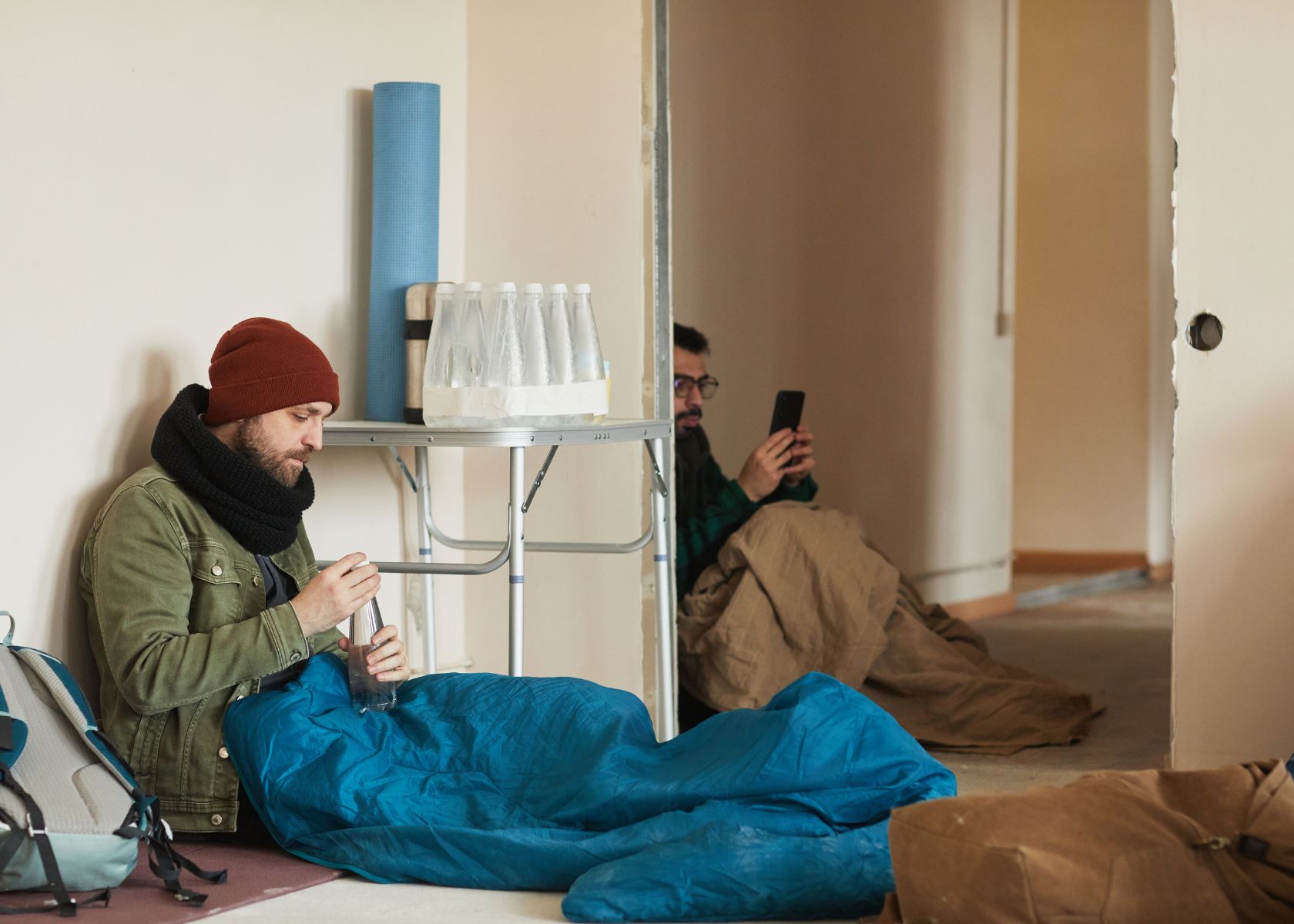
Living with a partner can create complex living situations, especially when it comes to property rights. Did you know that even if your girlfriend has not paid a thing towards the house, she may have established legal tenancy rights? Now, you might be wondering can my girlfriend kick me out of my own house, right?
Worry not. Because your girlfriend can’t just kick you out of your own house even if she has some rights to it.
In this article, we aim to unravel the complexities of cohabitation and ownership, helping you understand whether your girlfriend can legally kick you out of your own house.
Keep reading if maintaining peace at home while ensuring legal protection matters to you.
Key Takeaways
- Owning a house gives you certain rights, but if your girlfriend has established legal tenancy rights, she may have the authority to ask you to leave.
- Tenancy rights are determined by property ownership and the presence or absence of a lease agreement. Even if your girlfriend hasn’t contributed financially, she may still have “at will” tenancy rights.
- If you and your girlfriend are co-owners or tenants of a shared property, both parties have legal rights that need to be considered when it comes to eviction. However, being in an abusive relationship does not give her the right to evict you from your own home. Seek professional advice regarding property ownership and tenancy laws in your jurisdiction.
- In the worse situation, you can change the locks of your house and keep the keys to yourself.
Understanding Property Ownership and Tenancy Rights

Owning a house grants you certain rights while renting a house establishes a tenancy agreement with specific legal implications for eviction in shared properties.
Difference Between Owning a House and Renting a House
Owning a house means you hold the title to the property. You can make decisions about it without seeking permission from anyone else unless there are local zoning or homeowners association rules in place.
On the other hand, renting a house implies that you’re living in and paying someone else for the right to use their property for a set period of time. When you rent, your landlord holds ownership rights and is responsible for major repairs or upgrades.
Whether you own or rent greatly impacts how disputes about who can stay in the home get resolved legally. For instance, if you don’t own a property and have no tenant agreement with your girlfriend, she may be able to legally kick you out of your shared home.
How Tenancy Rights Are Established?
Tenancy rights are established based on the ownership of the property and the presence or absence of a lease or rental agreement. If your girlfriend is listed as the tenant or owner, she has the legal authority to ask you to leave.
However, even if she hasn’t contributed financially to the property, she may still be considered an “at will” tenant with the right to stay. In some cases, if your girlfriend has been living in your home for an extended period, she may have established tenancy rights according to local laws.
It’s crucial to understand these legal implications and seek professional advice if you find yourself in this situation.
Legal Implications for Kicking Someone out Of a Shared Property
If you and your girlfriend are co-owners or tenants of a shared property, there are legal implications involved if one person wants to kick the other out. While it can vary depending on the specific circumstances and local laws, in general, both parties have rights that need to be considered.
If there is no lease or rental agreement, your girlfriend may be considered an “at will” tenant and could have legal rights to stay even if she hasn’t contributed financially. However, the fact is being in an abusive relationship does not give her the right to evict you from a home you own.
It’s important to understand the laws regarding property ownership and tenancy rights in your jurisdiction and seek professional advice if needed.
Addressing the Situation Amicably

Open communication is key when addressing the situation amicably with your girlfriend, as it can help to find a mutually agreed solution that respects both parties’ interests and rights.
Open Communication with Your Girlfriend
It is crucial to maintain open communication with your girlfriend when facing a conflicting living situation. By expressing your concerns and discussing the issue calmly, you may be able to find a resolution that works for both of you.
Sharing how you feel about the situation can help her understand your perspective, experience, fostering empathy and potential compromise.
Seeking Mediation or Counseling
- Consider seeking mediation or counseling to help address the conflict and find a resolution.
- Mediation can provide a neutral space for both you and your girlfriend to express your concerns, discuss your needs, and work towards a mutually agreed solution.
- A trained mediator can facilitate communication and guide the conversation toward finding a compromise that respects both parties rights and interests.
- Counseling can also be beneficial in addressing any underlying issues or conflicts that may be contributing to the tension in your relationship.
- A professional counselor can help you develop healthy communication strategies, manage emotions, and explore ways to improve your relationship dynamics.
- Mediation and counseling can be effective tools in resolving conflicts amicably without the need for legal intervention.
- It is important to approach mediation or counseling with an open mind, willingness to listen, and commitment to finding a fair resolution.
Finding a Mutually Agreed Solution
It is crucial to approach the situation with open communication and a willingness to find a mutually agreed solution. Discuss your concerns and feelings with your girlfriend, expressing your desire to address the conflicting living situation in a fair and respectful manner.
Consider seeking mediation or counseling as unbiased third parties who can help facilitate productive discussions toward reaching an agreement that works for both of you. Remember, finding common ground through compromise may help avoid legal complexities and further strain on the relationship.
Seeking Legal Advice

Consult with a lawyer to understand your rights and explore options for eviction if necessary. Don’t risk your legal standing – learn more about the steps you can take by reading on.
Consultation with A Lawyer
Consulting with a lawyer is essential if you are facing a situation where your girlfriend wants to kick you out of your own house. A lawyer can provide guidance and advice based on the specific laws and regulations in your jurisdiction.
They will help you understand your rights as a homeowner or tenant, assess the legal implications of the situation, and explore potential options for eviction if necessary. Seeking professional legal advice is crucial to ensure that you have accurate information and can make informed decisions regarding this complex matter.
Understanding Landlord-Tenant Laws in Your Jurisdiction
In order to navigate the complex issue of a girlfriend potentially kicking you out of your own house, it is crucial to have a clear understanding of the landlord-tenant laws in your jurisdiction.
These laws determine the rights and responsibilities of both landlords and tenants, including issues related to eviction, property ownership, and lease agreements. It is important to consult legal experts and familiarize yourself with these laws to ensure you are aware of your rights and how they apply to your specific situation.
Exploring Options for Eviction if Necessary
If you find yourself in a situation where eviction becomes necessary, there are several options available to you. Here are some steps to consider:
- Consult with a lawyer: Seek legal advice from an attorney who specializes in landlord-tenant disputes. They can guide you through the eviction process and ensure that you follow all necessary legal procedures.
- Understand local laws: Familiarize yourself with the specific landlord-tenant laws in your jurisdiction. Each state or region may have different regulations and requirements for evictions.
- Provide proper notice: Depending on your local laws, you may need to provide your girlfriend with an official written notice stating that she must vacate the property within a certain timeframe. This notice should comply with the legal requirements of your jurisdiction.
- File for eviction: If your girlfriend refuses to leave after receiving proper notice, you may need to file for eviction in court. This involves submitting the necessary paperwork and attending a hearing to present your case.
- Obtain a court order: If the court determines that eviction is justified, they will issue a court order authorizing the sheriff or law enforcement agency to remove your girlfriend from the property.
Documenting the Situation

Keep detailed records of any conversations and interactions regarding your living situation, as well as any evidence that demonstrates your ownership or shared ownership of the house.
Keeping Records of Conversations and Interactions
Record and document any conversations or interactions you have with your girlfriend regarding the living situation. This includes saving text messages, emails, or any other forms of communication that may be relevant to your case.
By keeping a record of these conversations, you can provide evidence of any agreements or disputes that arise during the process. Additionally, it is important to gather any relevant legal documents, such as property ownership papers or rental agreements, to support your claim in the event of legal proceedings.
Providing Evidence of Ownership or Shared Ownership
To establish your ownership or shared ownership of the house, you can provide the following evidence:
- Property deed or title document
- Mortgage or loan documents showing your name
- Receipts for property taxes or utility bills in your name
- Proof of payments made towards the purchase or maintenance of the house
- Any written agreements establishing co-ownership or financial contributions to the property
Gathering Any Relevant Legal Documents
When facing a conflicting living situation and potential eviction, it is crucial to gather any relevant legal documents to protect your rights and interests. Here are some important documents to consider:
- Proof of Ownership: Gather documents that establish your ownership of the property, such as the deed or mortgage papers.
- Lease or Rental Agreement: If there is a written lease or rental agreement in place, make sure to have a copy of this document on hand.
- Communication Records: Keep records of any conversations, emails, or text messages regarding the living arrangements and discussions about eviction.
- Evidence of Shared Ownership: If you co-own the property with your girlfriend, gather evidence such as joint ownership statements or shared mortgage payments.
- Police Reports or Restraining Orders: If there has been any domestic violence or abusive behavior, collect any relevant police reports or restraining orders that can support your case.
- Financial Documentation: Provide evidence of your financial contributions towards the property, such as bank statements showing mortgage payments or utility bills in your name.
- Legal Advice: Keep copies of any legal advice received from attorneys regarding your rights and options in the situation.
Frequently Asked Questions
Can my girlfriend legally kick me out of my own house?
No, your girlfriend does not have the legal authority to unilaterally remove you from your own house unless there is a court order or an agreement that grants her such rights.
What should I do if my girlfriend is trying to kick me out of my own house?
If you are facing a situation where your girlfriend is attempting to evict you from your own house, it is advisable to seek legal advice and consult with an attorney who specializes in real estate or property law.
What factors determine ownership rights in a shared residence?
Ownership rights in a shared residence depend on various factors such as the title of the property, mortgage agreements, tenancy laws, and any written agreements between both parties regarding ownership or occupancy.
How can I protect my rights if I want to stay in my own house despite disputes with my girlfriend?
To protect your rights and assert your claim on staying in your own house during disputes with your girlfriend, it’s important to gather evidence of ownership, consult with an attorney for proper legal guidance, and consider mediation or other methods of dispute resolution before resorting to litigation.
Conclusion
Whether your girlfriend can legally kick you out of your own house depends on the ownership of the property and the existence of any lease or rental agreement. If she is the owner or tenant, she may have the right to ask you to leave. But she just can’t simply kick or lock you out of your own house.
However, if you are in an abusive relationship, domestic violence does not give her the legal authority to evict you without following proper procedures. It is important to understand your rights and seek professional advice to navigate this complex situation.